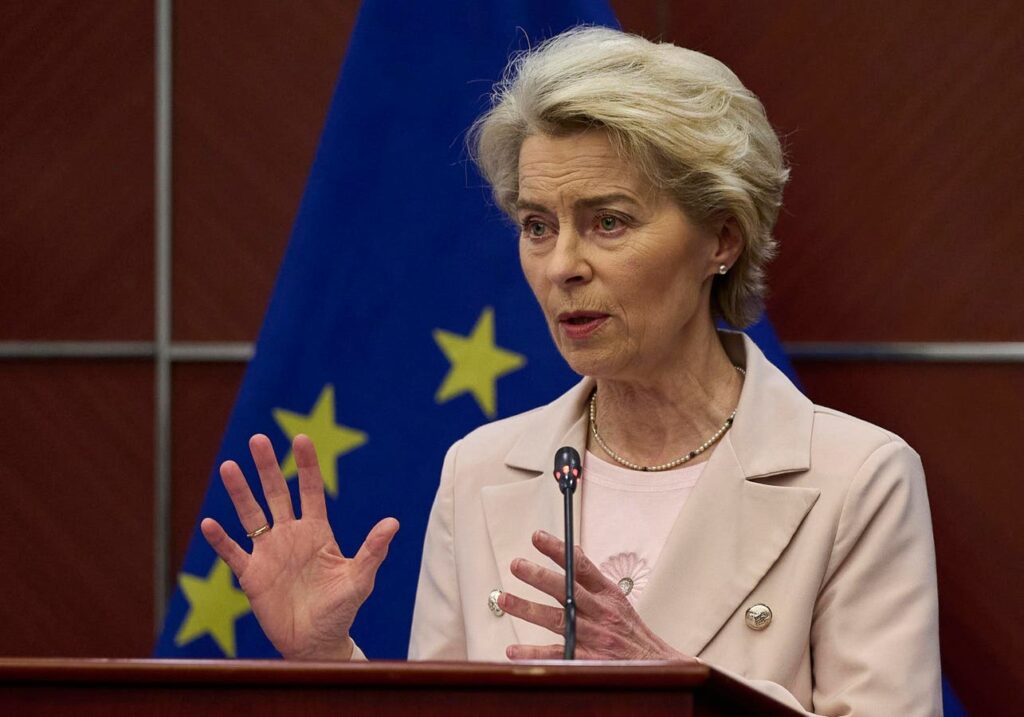European Commission President Ursula von der Leyen in 2023. (Photo by Kevin Frayer/Getty Images)
Getty Images
Leaders from around the European Union are meeting in Brussels. High on the agenda is irregular migration and in particular strategies to prevent more people arriving on Europe’s shores. Several member states have in recent months tightened their borders and systems to prevent people claiming asylum in their territories. Italy’s scheme to send asylum seekers to Albania has begun. Now, the head of the European Commission has proposed exploring possibilities for ‘return hubs’ outside of Europe to serve as asylum processing centers.
It is a busy week in Brussels. Policy wonks, advocates and representatives are descending on the European Union’s de facto capital for the European Council’s autumn meeting. Among such other topics as the war in Ukraine and the Gaza crisis, Europe’s leaders are expected to discuss irregular migration. Many present will be advocating the bloc explore policies of ‘offshoring’ asylum procedures, which is to say intercepting people trying to seek shelter in Europe and sending them to non-EU countries to have their claims processed.
Just a few years ago, the only game in town when it came to European offshore processing was the U.K.’s failed Rwanda scheme. That scheme, the brainchild of the previously long-reigning Conservative party, cost hundreds of millions of dollars and faced myriad legal and legislative challenges (at one point it required a bespoke bill introduced to parliament to unilaterally declare Rwanda a ‘safe’ country). The Labour party scrapped the plan as soon as it came into government in July 2024 and nobody ended up being involuntarily sent to Rwanda.
By that time, Italy was in the final stages of finalizing its own similar deal with Albania, costing nearly three quarters of a billion dollars over five years. The first group of people were sent to Albania mid-October. As yet the Albania deal is only with Italy, but lawmakers around Europe have already begun exploring their own ways to send asylum seekers elsewhere. German representatives with the Christian Democrats bloc are advocating Germany picks up the U.K.’s work on the Rwanda scheme and use it for their own offshoring. Germany’s chancellor agreed in principle to explore the idea.
These policies, considered fairly fringe just a few years ago, have taken hold in Europe amid perceptions of a renewed crisis of irregular migration. The amount of people arriving in Europe in 2024 is lower than the previous ‘migrant crisis’ of 2015/2016, but there have been increases in recent years. This has coincided with electoral gains of anti-immigrant far-right parties across Europe. In France, Emmanuel Macron narrowly avoided losing an election to the National Rally in mid-2024. Austria saw a far-right party come first in an election for the first time since the Second World War. The Alternative for Germany party has been making big gains in state elections in Germany, and polling suggests they pose a real challenge to the Social Democrat-led coalition in 2025’s general election.
Amid these developments liberal governments across Europe have begun to embrace immigration policies long championed by the right. Germany, Finland and Poland are pursuing policies to prevent people applying for asylum in their territories, including closing borders. Even the U.K.’s Labour Prime Minister Keir Starmer, who long criticized the Conservative Rwanda plan, has spoken with admiration of Italy’s Albania scheme.
Ahead of the European Council meeting in Brussels, European commission president Ursula von der Leyen suggested the bloc could explore the possibility of ‘return hubs’ outside of Europe, along the lines of the Albania scheme. Such a strategy would likely be beset by legal challenge, as it may violate both international and European refugee and human rights conventions. At the same time, it risks setting a dangerous precedent.
“This approach to engagement with third countries should worry those who value Europe’s ‘strategic autonomy’ and its credibility in its external relations,” wrote Amnesty International’s Olivia Sundberg Diez in July 2024. “The outsourcing of asylum processing sends a dangerous signal to the rest of the world about the EU’s lack of commitment to responsibility-sharing, international treaties and the global refugee-protection system.”
Source link : http://www.bing.com/news/apiclick.aspx?ref=FexRss&aid=&tid=6710fa1e51c04b27b6b315edeb9a2d00&url=https%3A%2F%2Fwww.forbes.com%2Fsites%2Ffreylindsay%2F2024%2F10%2F17%2Fmigration-and-asylum-offshoring-top-of-european-union-council-agenda%2F&c=10503044253127659011&mkt=de-de
Author :
Publish date : 2024-10-17 04:23:00
Copyright for syndicated content belongs to the linked Source.
